|
|
|
Sort Order |
|
|
|
Items / Page
|
|
|
|
|
|
|
| Srl | Item |
| 1 |
ID:
158722
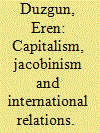

|
|
|
|
|
| Summary/Abstract |
Debates over ‘modernity’ have been central to the development of historical-sociological approaches to International Relations (IR). Within the bourgeoning subfield of International Historical Sociology (IHS), much work has been done to formulate a historically dynamic conception of international relations, which is then used to undermine unilinear conceptions of global modernity. Nevertheless, this article argues that IHS has not proceeded far enough in successfully remedying the problem of unilinearism. The problem remains that historical narratives, informed by IHS, tend to transhistoricise capitalism, which, in turn, obscures the generative nature of international relations, as well as the fundamental heterogeneity of diverging paths to modernity both within and beyond western Europe. Based on the theory of Uneven and Combined Development, Political Marxism, and Robbie Shilliam’s discussion of ‘Jacobinism’, this article first reinterprets the radical multilinearity of modernity within western Europe, and then utilises this reinterpretation to provide a new reading of the Ottoman path to modernity (1839–1918). Such a historical critique and reconstruction will highlight the significance of Jacobinism for a more accurate theorisation of the origin and development of the modern international order, hence contributing to a deeper understanding of the international relations of modernity.
|
|
|
|
|
|
|
|
|
|
|
|
|
|
|
|
| 2 |
ID:
184131
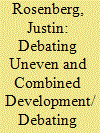

|
|
|
|
|
| Summary/Abstract |
This forum arises from an online event on the theory of uneven and combined development (UCD). Following an introduction which proposes a ‘special affinity’ between UCD and International Relations (IR), four presenters at that event discuss their ‘view from outside’ UCD, including perspectives from Global Historical Sociology, Realism, Decolonial theory and Gramscian Marxism. Meanwhile four members of the audience add their views on UCD and disciplinarity, the need for pluralism in UCD methodology, UCD and ‘whiteness’, and its potential contribution to ecological theory and practice.
|
|
|
|
|
|
|
|
|
|
|
|
|
|
|
|
| 3 |
ID:
180353
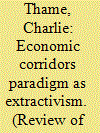

|
|
|
|
|
| Summary/Abstract |
Economic corridors are under construction across the planet. Trillions of dollars are being spent and they will have significant implications for international politics and, ultimately, world order. However, there has been limited conceptual work on them to date, especially in International Relations. This article contributes to that gap by explaining the dominant rationale before offering a conceptualisation of economic corridors as an essentially extractivist paradigm. This counter-hegemonic proposition revolves around four relational theses: (1) economic corridors are a ‘fix’ for crises of capitalism; (2) economic corridors exacerbate class struggle; (3) economic corridors are tools for exploitation; (4) economic corridors facilitate financial extraction. In so doing it unmasks the dominant rationale as ideological cover for valorisation and accumulation based on extractive and exploitative relations with human and extra-human nature. Rather than contributing to inclusive and sustainable development as proponents claim, the article contends economic corridors reinforce power asymmetries between states, countries, and classes, thereby extending and entrenching processes of uneven and combined development. The argument is substantiated with empirical reference to mainland Southeast Asia but aims to advance understanding of extractive dynamics integral to the concept of economic corridors and hence operative worldwide.
|
|
|
|
|
|
|
|
|
|
|
|
|
|
|
|
| 4 |
ID:
152341
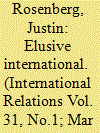

|
|
|
|
|
| Summary/Abstract |
This piece responds to the critical commentaries offered in this forum. I re-state the core aspects of the thesis and emphasize four themes related to theory in response to the critics: (1) Levels of Theory, (2) Locations of Theory, (3) Disciplines of Theory and (4) Ideologies of Theory.
|
|
|
|
|
|
|
|
|
|
|
|
|
|
|
|
| 5 |
ID:
077897
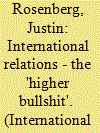

|
|
|
|
|
| Publication |
2007.
|
| Summary/Abstract |
This article replies to an earlier forum (International Politics (42.3) on 'Globalization Theory: a Post Mortem'. Whereas the 'Post Mortem' had criticized Globalization Theory largely for its neglect of Classical Social Theory's achievements, the current paper emphasizes its reproduction of one of Classical Social Theory's greatest limitations: the failure to incorporate 'the international' into its theorization of historical development. This limitation, it is argued, may be overcome using the idea of 'uneven and combined development', an idea which is first reformulated (in order to re-connect the premises of social and international theory), and then used as a vantage point from which to respond to criticisms of the 'Post Mortem'. 'The international', it turns out, is not the fading reality postulated by Globalization Theory but rather a fundamental dimension of social existence that IR, uniquely among the social sciences, encounters as its core subject matter
|
|
|
|
|
|
|
|
|
|
|
|
|
|
|
|
| 6 |
ID:
146002
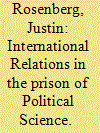

|
|
|
|
|
| Summary/Abstract |
In recent decades, the discipline of International Relations (IR) has experienced both dramatic institutional growth and unprecedented intellectual enrichment. And yet, unlike neighbouring disciplines such as Geography, Sociology, History and Comparative Literature, it has still not generated any ‘big ideas’ that have impacted across the human sciences. Why is this? And what can be done about it? This article provides an answer in three steps. First, it traces the problem to IR’s enduring definition as a subfield of Political Science. Second, it argues that IR should be re-grounded in its own disciplinary problematique: the consequences of (societal) multiplicity. And finally, it shows how this re-grounding unlocks the transdisciplinary potential of IR. Specifically, ‘uneven and combined development’ provides an example of an IR ‘big idea’ that could travel to other disciplines: for by operationalizing the consequences of multiplicity, it reveals the causal and constitutive significance of ‘the international’ for the social world as a whole.
|
|
|
|
|
|
|
|
|
|
|
|
|
|
|
|
| 7 |
ID:
179045
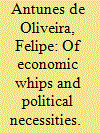

|
|
|
|
|
| Summary/Abstract |
After being recovered and expanded by Justin Rosenberg almost two decades ago, Trotsky’s concept of Uneven and Combined Development (UCD) has inspired many articles, dissertations and books, becoming the core of one of the most exciting contemporary approaches within the cacophonic discipline of International Relations. Nevertheless, the contribution of the emerging UCD literature remains largely unbalanced. Most of it revolves around the classical sociological problems of capitalist transition and state formation. As such, the UCD scholarship disproportionately belongs to the field of international historical sociology, favouring expansive explanations and broad historical questions. With few exceptions, contemporary UCD has had little to say in shorter-term, policy-oriented, International Political Economy (IPE) debates. To fruitfully inform IPE analysis, UCD must expand and refine its highly abstract conceptual toolkit. In this article, I take stock of the existing literature and offer an original contribution to the UCD-IPE framework. Specifically, I unpack the general notion of the ‘whip of external necessity’ into more granular and operational concepts, setting the foundations for a UCD-inspired exchange-rate, monetary and fiscal policy analysis. Finally, the potential of an expanded UCD-IPE framework is illustrated through considerations on the uneven and combined effects of the 2008 financial crisis.
|
|
|
|
|
|
|
|
|
|
|
|
|
|
|
|
| 8 |
ID:
179039
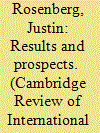

|
|
|
|
|
| Summary/Abstract |
This paper introduces the Special Issue on Uneven and Combined Development (UCD). It begins by briefly outlining the idea of UCD and reviewing its history – from its origins in the writings of Leon Trotsky to its contemporary renaissance in the field of international studies. A second section then introduces the contributions to this Special Issue, showing how they amount to a powerful new wave of UCD studies.
|
|
|
|
|
|
|
|
|
|
|
|
|
|
|
|
| 9 |
ID:
186292
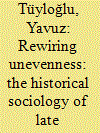

|
|
|
|
|
| Summary/Abstract |
Echoing the theory’s original application by Leon Trotsky, the empirical scope of the recent scholarship deploying uneven and combined development (UCD) has been largely confined to the consequences of unevenness between modern Europe and the non-European world. This article seeks to enrich the causal portfolio of UCD by ‘rewiring’ that primary unevenness of the modern period via ‘Eastern circuits’ of secondary unevenness. It argues that primary unevenness and its resultant European whip of external necessity should be conceptualized beyond the singular linear cause-and-effect trajectory running from the ‘West’ to the ‘Rest’. For fastening the empirical dynamism of unevenness to static ‘civilizational’ scales does disservice to the neo-Trotskyist ambition toward empirically recovering the multilinearity of development.
|
|
|
|
|
|
|
|
|
|
|
|
|
|
|
|
| 10 |
ID:
079907
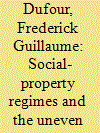

|
|
|
|
|
| Publication |
2007.
|
| Summary/Abstract |
Concepts like `nation', `society', and `culture' name bits and threaten to turn names into things. Only by understanding these names as bundles of relationships, and by placing them back into the field from which they were abstracted, can we hope to avoid misleading inferences and increase our share of understanding. (Wolf, 1997: 3)
Theories of International Relations have often shied away from apprehending the historicity of modern nationalism. Inversely, theories of nationalism have not spent much time theorizing the inter-national. The analysis of the relationships among social relations, international orders and nationalism has fallen in the cracks between the field of IR and the field of comparative nationalism. In the context of a renewal of interest for the historical sociology of the international, the analysis of these relations remains of particular relevance. In this article, the author builds on Benno Teschke, Justin Rosenberg and Hannes Lacher's theorization of modern sovereignty, capitalism and the uneven and combined development of International Relations to recast the socio-historical conditions of emergence and diffusion of the modern national form
|
|
|
|
|
|
|
|
|
|
|
|
|
|
|
|
| 11 |
ID:
123583
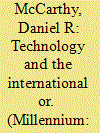

|
|
|
|
|
| Publication |
2013.
|
| Summary/Abstract |
Technological determinism as a theory of social change has been thoroughly tarnished in social theory, science and technology studies, and the discipline of International Relations. If once claims to an ahistorical development of technology (e.g. Cohen, 1978) were treated with significant respect, this is no longer the case. Indeed, it is by now a ritual to disclaim any notion of technological determinism in theories of international relations and the non-human world (Peoples, 2010; Herrera, 2006; McCarthy, 2011). Yet we must be careful of not throwing out the power of technological determinations with the teleological bathwater. This article attempts to develop a sociological account of technological determinism as dependent upon 'the International'. I will argue that technological determinism operates due to the presence of multiple political communities. Technological determinism is thereby reconceptualised as a distinct form of power in international politics.
|
|
|
|
|
|
|
|
|
|
|
|
|
|
|
|
| 12 |
ID:
194073


|
|
|
|
|
| Summary/Abstract |
This article explores the constitutive impact of the ‘international’ on the sociopolitical transformations in Syria and Libya through the lens of the theory of Uneven and Combined Development (UCD). The conventional and numerous critical analyses of Syrian and Libyan sociopolitical change suffer from a Eurocentric and stagist understanding of development. This paper argues that development problems can be better conceptualized with an interactive framework made possible by the UCD theory. In this context, we focus on how the expansion and consolidation of capitalism through the dynamics of UCD have concretely shaped the process of sociopolitical transformation in Syria and Libya to shed light on how the international and the local have articulated to produce the socioeconomic and political outcomes in these two states. We conclude by arguing that the theory of UCD provides an alternative conceptualization in explaining the specific development trajectories in both countries.
|
|
|
|
|
|
|
|
|
|
|
|
|
|
|
|
| 13 |
ID:
190797
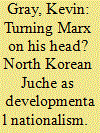

|
|
|
|
|
| Summary/Abstract |
The existing literature on North Korea has been divided over whether the country’s state ideology of Juche should be regarded as a variant of Soviet Marxism-Leninism or whether the explicit voluntarism of Juche means that it should be viewed as a distinctive indigenous ideology. Drawing on Trotsky’s theory of uneven and combined development and Gramsci’s theory of ideology, the paper argues that North Korea’s status as a geopolitically insecure postcolonial country engaged in a forced march from “backwardness” to a modern industrialized economy has had a decisive impact on both the form and content of North Korean state ideology. Understood as a form of developmental nationalism that seeks not only to legitimize authoritarian rule but also to create a collective subjectivity suited the task of rapid catch-up national development, Juche constitutes a combined ideological form that rests on Marxist-Leninist origins but has deliberately drawn on existing forms of “common sense” conducive towards the mass mobilization of society. In doing so, this paper critically engages with the argument that the voluntarism of Juche represents a decisive break from the supposedly objective laws of Marxism and Marxism-Leninism, thereby “turning Marx on his head.”
|
|
|
|
|
|
|
|
|
|
|
|
|
|
|
|
| 14 |
ID:
179044
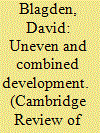

|
|
|
|
|
| Summary/Abstract |
Leon Trotsky’s notion of ‘uneven and combined development’ (UCD) has been gaining traction as an explanatory theory of international relations over the past decade, notably in work by Justin Rosenberg and Alexander Anievas. The idea that the uneven sequencing of economic development between countries affects both their relative power relationships and domestic political stability, in particular, carries prima-facie intuitive plausibility. The potential consequences for international stability of such relative power shifts and domestic upheavals suggest, furthermore, that there may be significant explanatory payoffs from this line of investigation. At the same time, however, the UCD intuition raises other questions about causal foundations and theoretical affiliations. What accounts for the sequencing of uneven development, for example? And how exactly do both relative power shifts and domestic political instability elevate war risks? This paper will address these lacunae, by demonstrating that – at the level of its underlying micro-foundations – UCD can be understood as a compound of catch-up convergence growth theory and security-dilemma realism. Such a recognition paves the way, in turn, for a fruitful application of UCD to contemporary questions in international politics.
|
|
|
|
|
|
|
|
|
|
|
|
|
|
|
|
| 15 |
ID:
113811
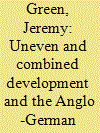

|
|
|
|
|
| Publication |
2012.
|
| Summary/Abstract |
This article attempts to situate the approach to World War I within the context of the uneven and combined development of 19th-century European capitalism. Through a comparative analysis of German and British development within the context of the epochal transition from feudalism to capitalism, the article proposes that existing historical materialist and Realist understandings of the roots of World War 1 are inadequate. Realist analyses, stressing the primacy of 'geopolitics', fail to provide a convincing explanation of the precise origins of German bellicosity. Instead they assume that expansionist German behaviour was an inevitable consequence of systemic anarchy. Historical materialist accounts, preferring a sociological explanation, overstate the importance of systemic capitalist crisis and the European-wide escalation of class struggle for understanding the genesis of the war. Utilizing Trotsky's concept of uneven and combined development, I contend, enables a more comprehensive understanding of the origins of the conflict.
|
|
|
|
|
|
|
|
|
|
|
|
|
|
|
|
| 16 |
ID:
079486
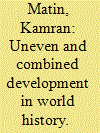

|
|
|
|
|
| Publication |
2007.
|
| Summary/Abstract |
IR's turn towards historical sociology is yet to overcome its ahistoricism. This lack of world-historical perspective, particularly conspicuous in relation to the non-European world, and arguably IR's emergence as a discipline, can be traced back to the theoretically fateful negligence of `the international' by the classical (historical) sociology on which the contemporary critiques of the mainstream IR theory tend to draw. This article develops this argument within the context of a theoretical reappraisal of the traditional approaches to the problematique of the premodern state in Iran and proposes an alternative theoretical framework that is critically drawn on Trotsky's theory of uneven and combined development as an internationally augmented historical materialism. Thus it argues that central to the premodern state-formation in Iran were the nomadic geopolitical pressure upon, and rule over, the agrarian Iranian society which gave rise to a synergetic nomadic-sedentary relationship mediated by, and crystallized in, the military-administrative institution of uymaq. This underlay the continuous formation, disintegration and re-production of successive states characterized by centralized patrimonial arbitrary rule.
|
|
|
|
|
|
|
|
|
|
|
|
|
|
|
|
| 17 |
ID:
179049
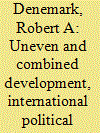

|
|
|
|
|
| Summary/Abstract |
Rosenberg and Boyle's ‘Understanding 2016: China, Brexit and Trump in the history of uneven and combined development’ (2019) is an insightful analysis. It leverages the theory of uneven and combined development (UCD) derived from Trotsky's work on the puzzle of why the proletarian revolution emerged in underdeveloped Russia. The analysis fulfills many of the requirements for reinvigorating IPE set out by dissatisfied senior scholars who lament the narrowing of the study of IPE. But UCD is not unique in this regard. It shares many attributes with world-systems analysis (WSA). I argue that instead of searching for philosophical excuses for ignoring others, we should speak to similarities as well as differences, and seek insights from other perspectives. WSA insights on China, the west, the nature of combination and inequality, and the periphery, are then reviewed. I conclude that scholars of UCD and WSA should be considering one another’s work.
|
|
|
|
|
|
|
|
|
|
|
|
|
|
|
|
| 18 |
ID:
184048
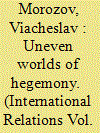

|
|
|
|
|
| Summary/Abstract |
The neo-Marxist literature on uneven and combined development has made significant progress towards a comprehensive theory of the international. Its point of departure is societal multiplicity as a fundamental condition of the international. This article identifies an important lacuna in the ontology of multiplicity: there is no discussion of what constitutes a ‘society’, or the basic entity capable of entering a relationship with other entities. Existing solutions, including those relying on relational sociology, gravitate towards ontological individualism. Building on poststructuralist neo-Gramscian theories, I propose to ground the conceptualisation of ‘society’ in the notion of hegemony. This implies a discursive ontology, which attributes the inside/outside dynamic to hegemonic formations rather than states or societies. Coupled with the understanding of hegemony as a scalar phenomenon, this ontology can account for the primacy of the state in modern times, while also enabling a research focus on other types of collectivities.
|
|
|
|
|
|
|
|
|
|
|
|
|
|
|
|
| 19 |
ID:
124621
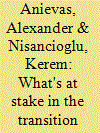

|
|
|
|
|
| Publication |
2013.
|
| Summary/Abstract |
This article draws on the theory of uneven and combined development (U&CD) to construct a non-Eurocentric and 'internationalist' analysis of the transition to capitalism. In doing so, we seek to respond to and rethink two challenges: exposures of Eurocentric notions of the 'Rise of the West' on the one hand; and recent critiques of Eurocentric assumptions in the theory of U&CD on the other. Beginning with an assessment of Robert Brenner's Anglo-centric theorisation of capitalism's origins, we argue Brenner's efforts are hamstrung by an omission of international determinations and conditions. In turn, we retrace these missing international factors through an analysis of the Mongol invasions of the 13th/14th centuries, Ottoman imperial expansion in the 15th/16th centuries and the contemporaneous discovery and colonisation of the New World. We argue that each case demonstrates the historically specific forms of U&CD that fed into - and ultimately determined - the developmental trajectory of capitalism in north-western Europe.
|
|
|
|
|
|
|
|
|
|
|
|
|
|
|
|
| 20 |
ID:
153505
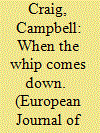

|
|
|
|
|
| Summary/Abstract |
This article examines the conflict between traditional Marxist attitudes toward war and the problem of the nuclear revolution. It shows how the advent of the nuclear revolution in the 1950s undermined traditional Marxist-Leninist concepts of war, and then goes on to argue that this development must be placed at the centre of contemporary Marxian IR if it is to have explanatory power in the twenty-first century. To make this case directly, it engages with Justin Rosenberg’s revival of Trotsky’s idea of uneven and combined development and its subsidiary law of ‘the whip of external necessity’, and argues that the whip can remain salient today only if one accepts the political utility of nuclear war. The impasse created by the nuclear revolution, it concludes, points Marxist IR in the direction of classic Marxist visions of supranationalism and human unity.
|
|
|
|
|
|
|
|
|
|
|
|
|
|
|
|
|
|
|
|
|